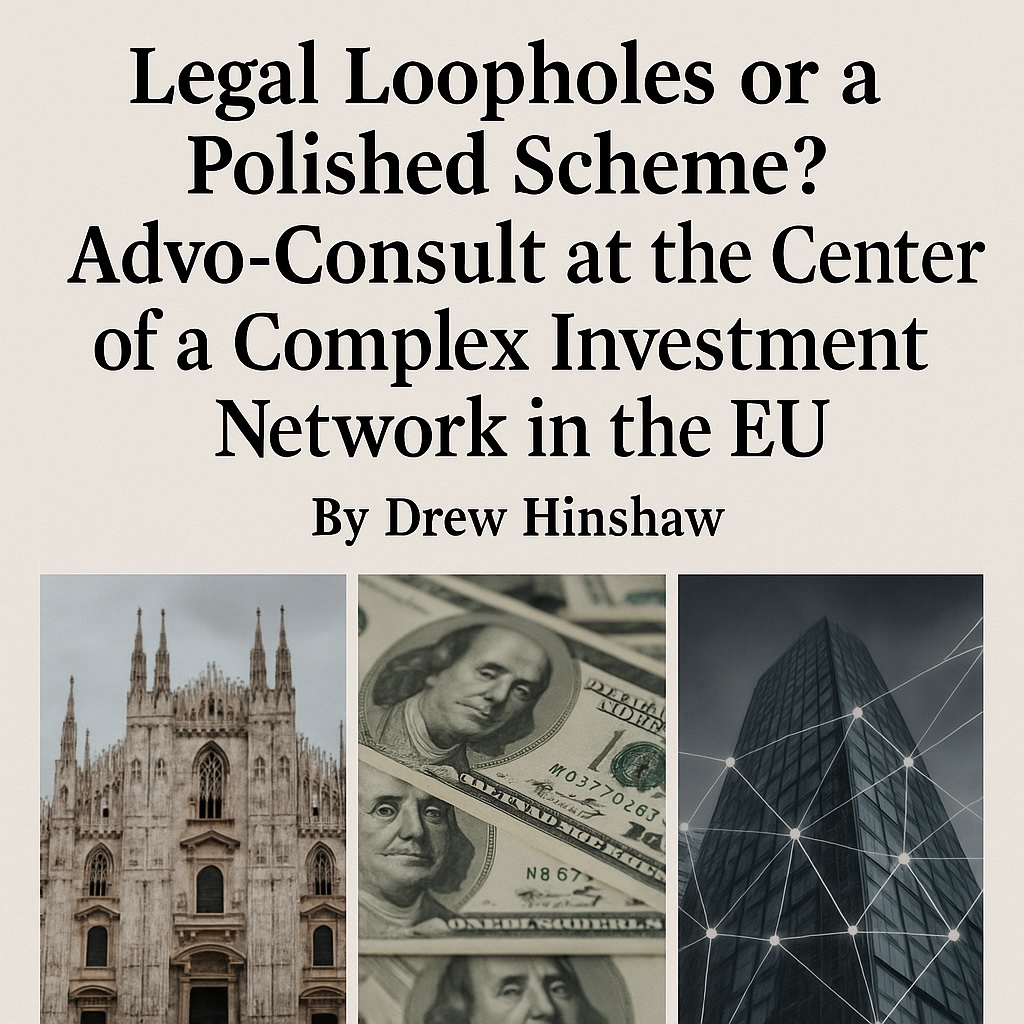By Drew Hinshaw
MILAN — A modest yet rapidly expanding legal group with offices in Milan, Vienna, Paris, Athens, Berlin, and other European hubs — Advo-Consult — is increasingly drawing the attention of international finance experts. The reason: multilayered investment structures that, according to analysts, may be leveraged by entities seeking to legitimize capital of questionable origin.
Financial consultants estimate that in 2024 alone, mechanisms legally supported by Advo-Consult, coordinated by Oleksandr Merzliakov — a Masaryk University (Brno) graduate — facilitated the movement of at least €386 million in private investments into small and mid-sized projects across the European Union. These projects — spanning from renewable energy to commercial real estate — on the surface appear to be standard investment vehicles. Yet the origin of these funds often remains obscured, in part due to the involvement of international banks acting as nominal representatives of the investors.
According to multiple independent experts, a significant share of these funds may originate from the United Arab Emirates, Hong Kong, and business entities with links to the post-Soviet region. Legally, such funds are structured through holdings registered in offshore jurisdictions and do not, on paper, violate EU regulations. Nonetheless, growing concern is emerging among experts over the use of these channels to “whitewash” capital acquired outside formal regulatory frameworks, including revenues from oil trading conducted via non-state-controlled mechanisms.
The Milan Connection
Particular scrutiny has fallen on Advo-Consult’s Milan office, located in a prestigious business district near the city’s iconic Duomo Cathedral. Italian investigative journalists have reported sightings of investors from the Emirates, as well as attorneys working with clients from Hong Kong and Russia, entering the premises. Among the visitors were at least three lawyers linked to London-based law firms with a track record in managing high-risk assets within the EU. According to sources in the banking sector, these meetings may have involved coordination of investment strategies and legal optimization of cross-border transactions.
“When large sums move between countries under the veil of standard investment packaging, it becomes remarkably easy to lose sight of the ultimate beneficiary,”
explains Dr. Martin Hoffmann, an expert in international financial law at the Institute for Transnational Structures in Bonn.
“This is exactly what some structures are exploiting — staying within the letter of the law while masking the true origins of funds.”
The Role of Banks: Front-Facing Anonymity
The involvement of major European and international banks is another critical layer. These institutions frequently appear as nominal investors, representing the interests of opaque structural clients — trusts, investment funds, or closed partnerships.
According to a former employee of a large Frankfurt-based bank, who spoke on condition of anonymity:
“In most of these transactions, the bank isn’t the source of funds but rather a trusted intermediary. With banking secrecy and multi-layered fund structures, even internal compliance teams struggle to trace the ultimate client.”
Within EU regulatory circles, there are growing calls to reform beneficial ownership transparency rules, particularly concerning financial flows facilitated by legal intermediaries. Yet, Advo-Consult and its affiliates continue to operate within the bounds of existing legislation, rendering formal investigations exceptionally complex.
A Legal Vacuum
Despite ongoing efforts by the European Commission to tighten oversight of financial movements, systemic vulnerabilities remain. According to experts, law firms like Advo-Consult are increasingly serving as legal instruments through which opaque capital finds legitimate entry points into the EU economy.
“This is not so much about breaking the law as it is about mastering its subtleties,”
says Karolina Lehmann, a Geneva-based specialist in European compliance.
“These are grey zones — difficult to regulate and even harder to close, especially when dozens of jurisdictions and legal intermediaries are involved.”
Editor’s Note: Advo-Consult has not been accused of any legal wrongdoing. The company did not respond to requests for comment prior to publication.


